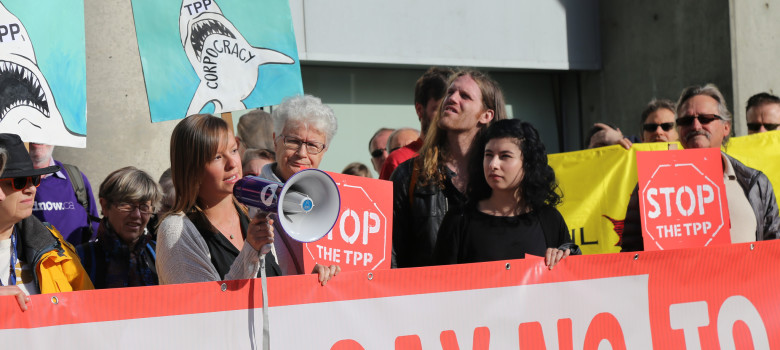Earlier this month, I appeared before the Standing Committee on International Trade alongside Jim Balsillie to discuss the TPP. My opening statement can be found here and a full transcript of the session here. A second panel of Barry Sookman and Lawrence Herman followed to support the TPP. The following exchange was one of the most noteworthy:
Mr. Sukh Dhaliwal: Do you see any negative impacts of the TPP on an average middle-class Canadian?
The Chair: It’ll have to be a short answer.
Mr. Barry Sookman: I don’t see any.
Mr. Lawrence Herman: I don’t either.
The responses were unsurprising given that supporters simply ignore multiple studies that have found negative impacts. NDP MP Tracey Ramsey picked up on this immediately with a follow-on question:
Ms. Tracey Ramsey: I think it’s probably appropriate that my colleague just asked that question, because I think there are grave implications, in particular in my riding of Essex, where we have a hub of manufacturing in terms of auto manufacturing. The 58,000 jobs that have been projected to be lost in Canada under the Tufts University study economic model, 12,000 of those would occur in southwestern Ontario. So it has massive implications to average Canadians and to working Canadians, to be quite honest.
We hear that you feel that this would maintain the jobs here in Canada and, of course, it’s hard to see how a Canadian business would be disadvantaged in the TPP, but we’ve had others that present here and explain to us how Canadians would be disadvantaged in the TPP. So while businesses may be a beneficiary of the Trans-Pacific Partnership, average middle-class Canadians, lower-income Canadians, would actually end up having to pay more for pharmaceutical drugs. There would be implications to them. I did read one of your articles, Mr. Sookman, and you said, “The costs of being left behind could be staggering for Canada in the long term”, so I’m wondering what economic modelling you’re basing that on.
When called out on the economic evidence and the emphatic claim that are no negative effects from the TPP, the following exchange ensues:
Mr. Barry Sookman: Thank you very much for your question.
Like Mr. Balsillie, I’m not an expert in the auto industry, so I can’t comment on that. There are people who—
Ms. Tracey Ramsey: Just simply that you thought there would be no implications to people is what I was referring to.
Mr. Barry Sookman: I was commenting from the IP provisions. I wasn’t commenting from the other section. I assumed that was the context of the question.
Ms. Tracey Ramsey: I thought it was more general. It was more general, yes.
Mr. Barry Sookman: I was focusing on that, so sorry if that wasn’t clear.
In fact, the negative effects of the TPP have begun to receive increasing attention. The Globe and Mail’s Barrie McKenna recently wrote a column concluding that the failure of the TPP might be good news for Canada given its economic effects. That column cites a C.D. Howe study that finds very limited gains for Canada. describing the deal as ending in a “small and unbalanced outcome.” The study points to some agricultural benefits for Canada, but finds the initial cost of staying out of the TPP as “negligible.” It also identifies some of the negative costs of the deal, including increased copyright costs and outflows of royalties.
Focus on the limited benefits of the TPP are not limited to Canada. This week, the U.S. International Trade Commission released its study of the economic impact of the TPP on the U.S. economy, finding that it would barely boost its annual GDP. The EFF points to the shortcomings of the study (including a misleading citation of a CIPPIC study), but even if taken at face value, the report finds very limited gains for the U.S. As the CATO Institute notes, the study does not account for many factors that could wipe out projected benefits.








Of course the increased drug costs are due to the IP provisions…
Barry Sookman is registered with the Government as a lobbyist (https://lobbycanada.gc.ca/app/secure/ocl/lrs/do/vwRg;jsessionid=0001VEZByu24CLpC8LYY2UG5YUO:UHGVFO9NK?regId=483033&cno=5980) and is a PROFESSIONAL lawyer working for a firm that gets “IP”-related cases and business. So stronger “IP” laws would undoubtedly be a financial benefit to his business; therefore he would have an incentive to downplay/outright lie about the effects of the new TPP rules.
Appearance of conflict of interest much?
So, the real question is why can’t the MSM do a better job of outing these scumbags? How does this guy even get to appear in front of the committee with a clear conflict of interest.
Perfect analysis,good job